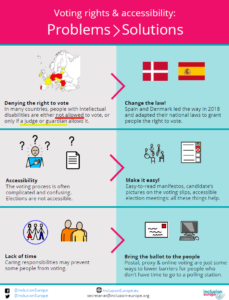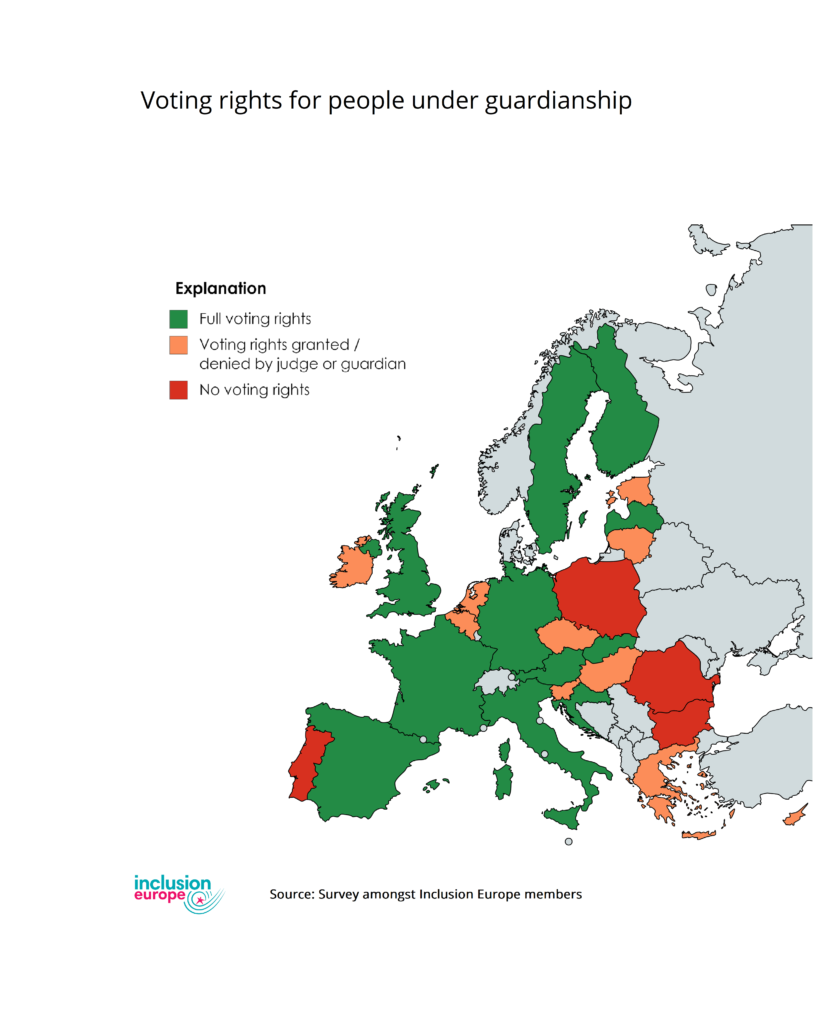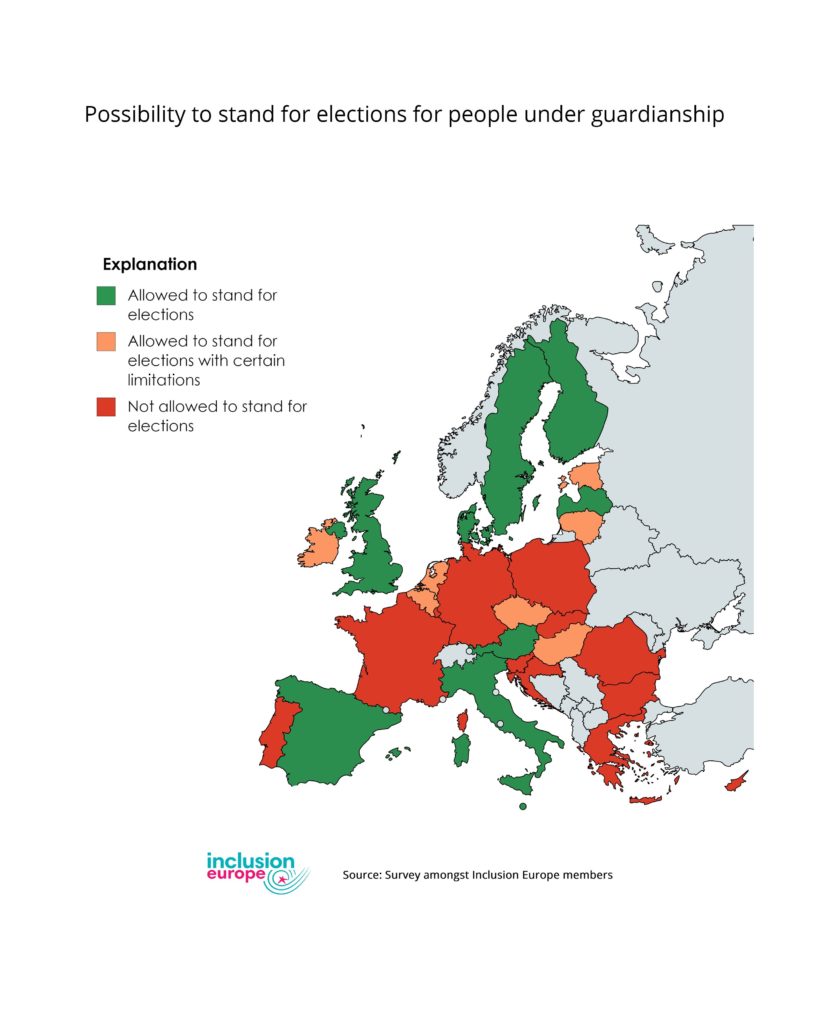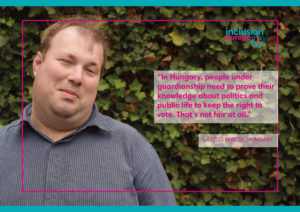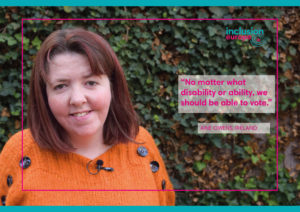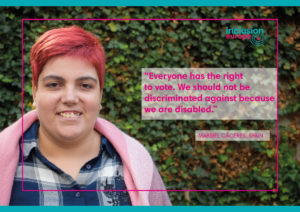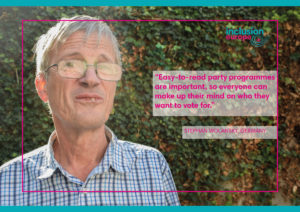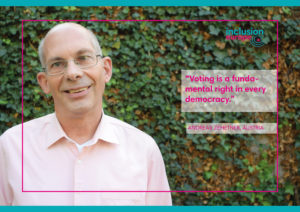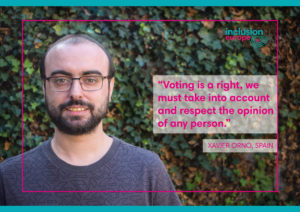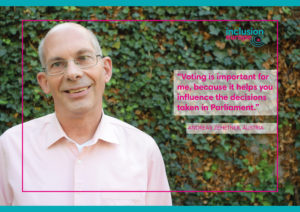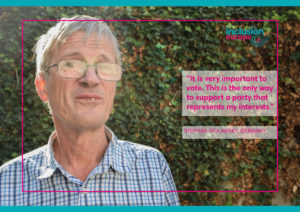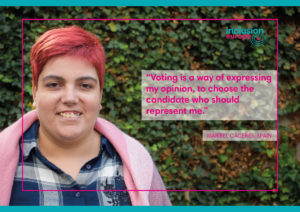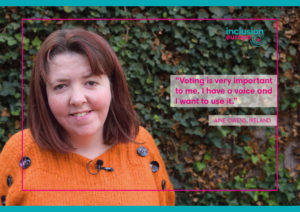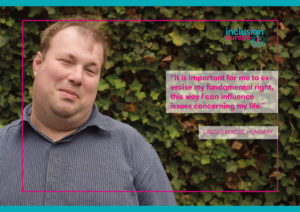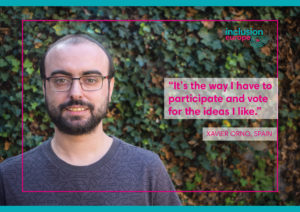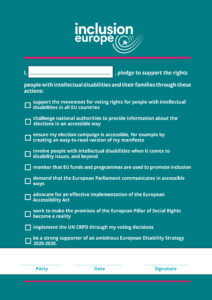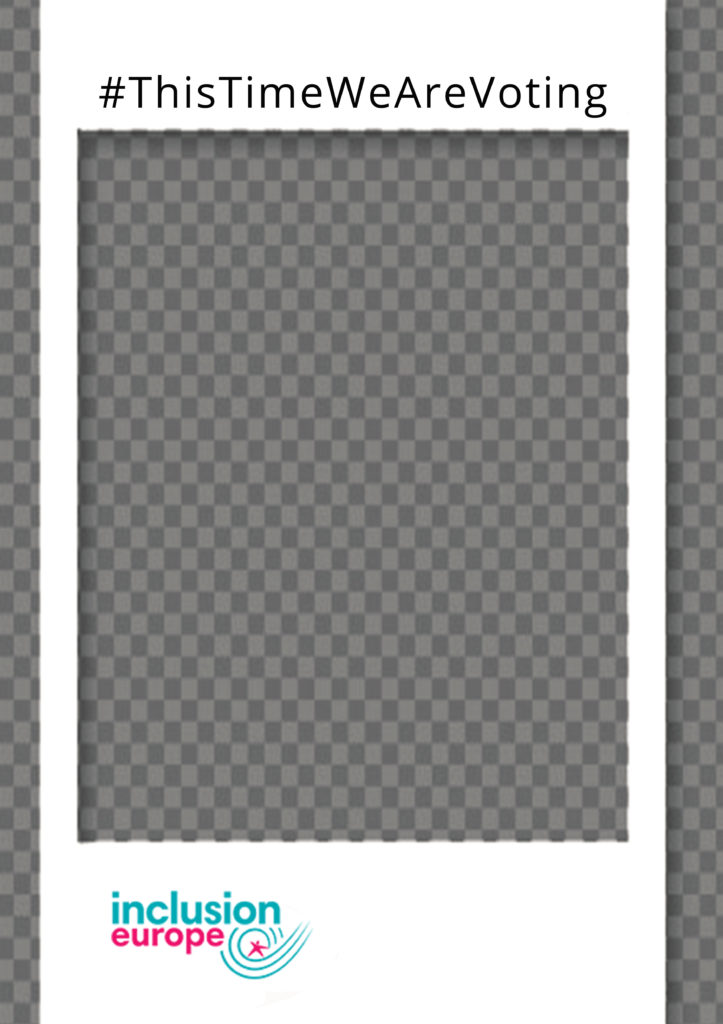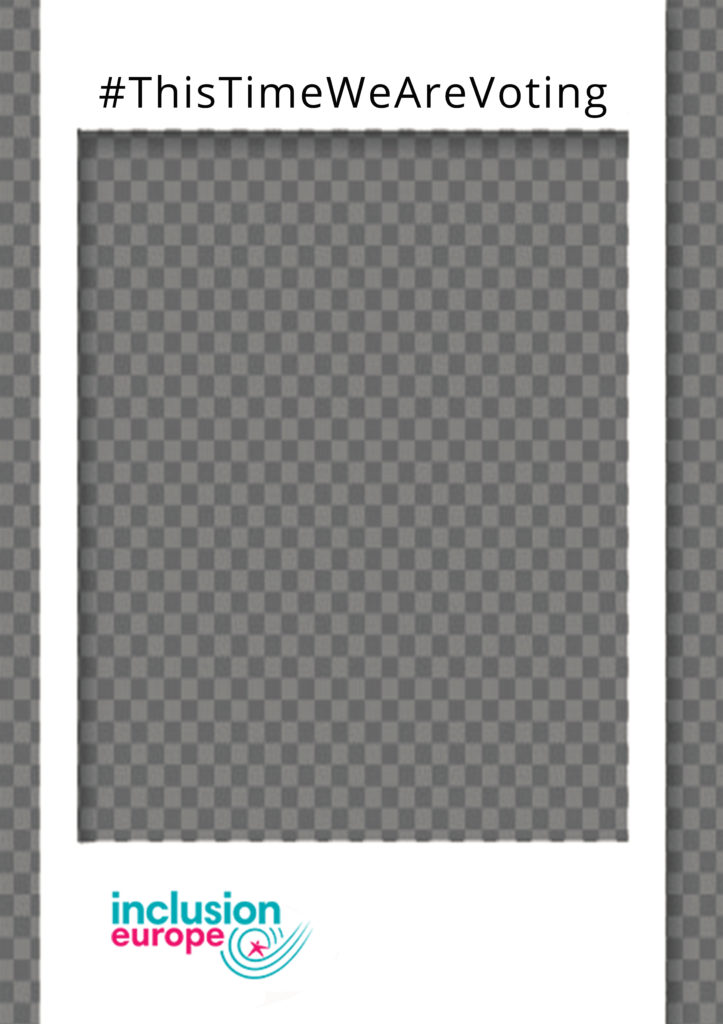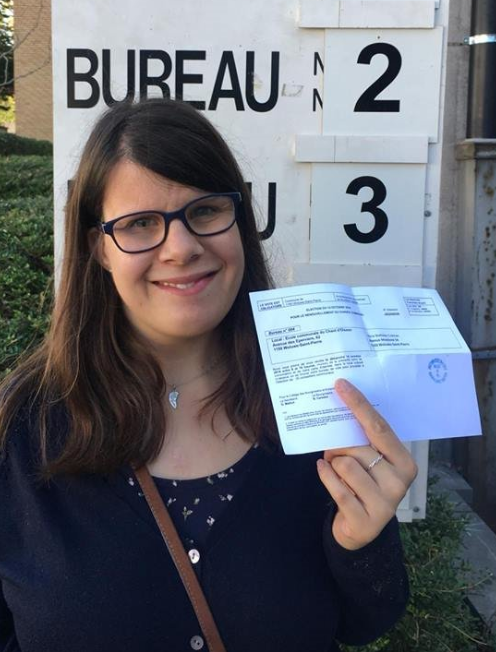
Self-advocate Mathilde Cotman voted at the Belgian municipal elections. She voted again in 2019!
Source: Inclusion asbl
The elections to the European Parliament happened in May 2019.
These elections were very important for people with intellectual disabilities
and their families!
Lots of self-advocates voted at the European elections.
Inclusion Europe prepared a manifesto
on how to make the most of the European elections in 2019.
The first two parts are for people who support the inclusion movement:
self-advocates, family members and all other activists and European Union citizens.
Part 1: Why are the European elections important?
Part 2: What people with intellectual disabilities, family members and other activists can do
The third part is for political parties and their candidates.
It is also for authorities in charge of organising elections, to help make elections more accessible.
Part 3: What Inclusion Europe thinks the candidates and parties should do for the European elections 2019
See also: Right to vote and political participation (.pdf), more language versions here
Why are the European elections important?
In May 2019, there will be elections to select new Members of the European Parliament (MEPs, for short).
The European elections are very important
for people with intellectual disabilities and their families.
Members of the European Parliament
make decisions that influence the lives
of all European Union (EU) citizens.
MEPs make decisions about laws.
These laws are about topics such as
the accessibility of products and services,
or the right to travel, live, and work within the European Union countries.
MEPs also make decisions about the money
for many activities and projects in European Union countries.
Members of the European Parliament help to select the European Commission’s President and Commissioners.
Commissioners are responsible for topics such as employment, social affairs, justice, education, and health.
MEPs monitor how the European Union is fulfilling
the United Nations (UN) Convention
on the Rights of Persons with Disabilities (CRPD).
This means that who is elected
to the European Parliament
is very important to you.
It is important to all of us in the inclusion movement.
Inclusion Europe wants to make sure the elections
have good results for people with intellectual disabilities
and their families.
You have a vital role in helping make this happen.
You can ask the candidates
to provide clear and accessible information.
You can ask the candidates to do things that support
people with intellectual disabilities and their families.
You should vote in the elections yourself,
and you should tell others to vote too.
The right to vote is very important.
It gives you the opportunity to decide the future of cities and countries,
and also the future of the European Union.
Some people have their right to vote taken away
by legal capacity laws.
This is wrong and must be changed.
Everyone has the right to vote.
Some people find it hard to vote
because they do not have clear information
about the elections.
Some people find it hard to vote
because nobody helps them to make a decision
or to communicate their decision.
Some people think it does not matter if they vote
because the candidates do not talk to them
and listen to them.
And for some people it is difficult to vote
because they care for a family member
with an intellectual disability and they do not have
the time or resources to go to the voting station.
This can be changed.
Things like this have been improving in many countries.
To improve things even further so that more people vote, we need to make the most
of the opportunities that come with the European elections.
The European Union is important for people with intellectual disabilities and their families.
There is a lot of talk about how the European Union works and if it is good to be part of it.
Some people are unhappy with the European Union
because they say it does many things they do not like.
Some other people are unhappy with the European Union
because they say it does not do enough of the things they would like it to do.
Inclusion Europe listens to these concerns
and we take them seriously.
At the same time, we see that
respect for the rights of people with intellectual disabilities and their families has very much improved
in the European Union over recent decades.
The quality of life for many people with intellectual disabilities and their families has improved too.
A lot of this progress has happened
thanks to the work of the European Union.
This is because living in the European Union means:
- Living in peace.
There has never been a war
in the European Union. - Improving quality of life.
The quality of daily life for many people
in the European Union has been improving.
We know that life can be a struggle,
especially for people with intellectual disabilities and their families.
Life for many people has been even harder following the recent economic crisis.
Still, the European Union invests in services
to improve the quality of people’s lives.
- Progress on rights and inclusion.
The European Union is based on human rights.
The European Union is the only organisation of countries that ratified the UN Convention
on the Rights of Persons with Disabilities.
The European Union puts a lot of money
towards making sure these rights are fulfilled.
We always strive for more progress towards inclusion.
We also need to protect the achievements
that have already been made.
Inclusion Europe calls on people with intellectual disabilities, their families, and all citizens
of the European Union to:
- Talk to the candidates in elections to make them aware of your opinions.
(You can use part 3 of this document
to get some ideas.)
- Tell your friends, families, and colleagues
why the European elections are important
and that they should participate in them too.
Help your friends and colleagues understand more about the elections and take part in them.
- Cast your vote in the European elections
to keep and strengthen your rights in Europe.
What people with intellectual disabilities, family members and other activists can do
Inclusion Europe has made this document to help you
and others prepare for the elections.
Talk to the candidates and their parties
Find out about the parties and the candidates in your country.
Write to them.
Call them and ask for a meeting.
At the meeting, or by phone or email:
- Tell the candidates to provide clear and easy-to-understand information about the elections.
Ask them what they want to do if they get elected.
Tell them about easy-to-read and why it is important.
- Tell the candidates to meet people with intellectual disabilities and their families.
This could mean visiting people with intellectual disabilities at school or at work.
Or there could be a specific event where the participants can ask the candidates questions.
Tell them why it is important to listen to
and talk with people with intellectual disabilities and their families
- Tell the candidate to do things that are important to you and other people with intellectual disabilities and their families.
Tell them what they should be doing if elected
to the European Parliament.
You can use this Inclusion Europe manifesto
on the 2019 elections to get ideas.
You can add your own ideas to make it more relevant to the candidates in your country.
You can also tell the candidates how you can help them.
For example, you can tell other people about candidates who care about what you have to say.
You can also share information about the candidates
and how they engage with you and other people with intellectual disabilities and their families.
Organise and cooperate with others
Get together with other people to talk about the elections.
Help them understand why the elections are important
to you and to other people with intellectual disabilities
and their families.
Tell them what you care about
and how the MEPs can influence your life.
Ask them to vote in the elections.
Work together to appear in the media and make your voice heard.
Work together to talk to national authorities
about the accessibility of elections and the right to vote.
Cast your vote
The European elections will be held
between 23 – 26 May 2019.
Every country can choose on which of these days it will hold the elections.
Put the date of the elections in your calendar
so you remember.
Go and vote.
Your vote matters.
What Inclusion Europe thinks the candidates and parties should do for the European elections 2019.
There are 7 million Europeans with intellectual disabilities.
We have many millions of family members
and friends.
Altogether, we are more than 20 million people.
Most of us face discrimination and exclusion
from society on a daily basis.
Children with intellectual disabilities are prevented
from going to school with their friends and neighbours.
Young people with intellectual disabilities have limited options to receive education and training
related to getting a job.
Many adults with intellectual disabilities
cannot get paid employment.
Hundreds of thousands of people with intellectual disabilities live in institutions, segregated from society and without a chance to lead a life as part of the community.
Very often, family members are left to provide all support and care for their relatives with intellectual disabilities, because there are not enough support services.
People with intellectual disabilities and their family members often have limited access to healthcare,
and suffer poor health as a result.
Many countries in the European Union deny
people with intellectual disabilities their right to vote.
This is wrong and must change.
Everyone has the right to vote.
People with disabilities have this right guaranteed
by the UN Convention on the Rights
of People with Disabilities.
Even in countries where the right to vote
is not taken away from people with intellectual disabilities, many find it hard to participate in elections.
The candidates do not take the time to talk
and to listen to them.
Information about elections is complicated
and not given in an accessible way.
The topics of election campaigns are often far
from the daily experiences and needs of people
with intellectual disabilities and their families.
We know it is already a struggle for candidates
in the elections for the European Parliament
to reach out and persuade the general public to vote.
We see that the low participation of voters is often used
to argue that the voice of the MEPs is less important.
We want as many people to vote as possible.
We talk to people to tell them to vote.
We care how the European Union protects the rights
of people with intellectual disabilities and their families.
We call on the candidates and parties
standing for European elections to:
- Engage with people with intellectual disabilities
and their families, who make up more than 20 million European Union citizens. - Provide clear and accessible information.
- Deal with issues that are important to people with intellectual disabilities and their families.
1. Engage with people with intellectual disabilities
and their families.
Meet, listen, talk.
Organise discussions including people with intellectual disabilities and their families so you can listen to their views – and explain your own.
Visit people with intellectual disabilities
at work or school, to gain an idea of their lives.
Make sure you talk with people with intellectual disabilities directly, not only to their support or care staff.
Make sure to ask about what they would like to do
in their lives, and where would they like to live.
Ask about how they are supported to participate
in elections.
Include people with disabilities in everything you do.
When organising a meeting about disability related issues, always include people with intellectual disabilities.
Refuse to take part in such meetings if they do not include people with intellectual disabilities.
Organise meetings at times that are convenient for those who care for their family members.
Provide care support so they can take part.
2. Provide clear and accessible information.
Prepare your election manifesto in plain,
easy to understand language.
Better still, provide an easy-to-read version.
Easy-to-read makes information accessible
for everyone, not just people with intellectual disabilities.
Get in touch with organisations that help with accessible information.
Learn more about easy-to-read at www.easy-to-read.eu.
Tell people about elections in a way that is easy
to understand.
Let people know who can vote, when, where, and how.
Make sure people know about the parties
and the candidates in the run-up to the election.
During voting, make sure information is easy
to understand.
This may include having pictures of the politicians
on the ballot.
Remove barriers that prevent people from voting.
Take the voting to where people live.
Make sure polling stations are marked in a way that is easy to understand.
Make sure polling stations (including the voting booths) are also accessible to persons in a wheelchair.
Make sure there is assistance available during voting.
This includes making sure people can be accompanied
to the voting booth if required.
Make sure there are arrangements
for those who cannot get to the voting station.
This includes family members who care for their relatives with disabilities and who will have difficulties finding time and resources to go and cast their vote.
3. Deal with issues that are important to people
with intellectual disabilities and their families.
Disability rights
Implement the UN Convention on the Rights of Persons with Disabilities through your voting decisions.
Lead towards an ambitious European Disability Strategy 2020-2030.
Pay attention to issues such as the right for people
to make their own decisions, and ending segregation.
Improve accessibility in Europe by supporting the implementation of the European Accessibility Act and take additional actions to ensure that European services and products are accessible to everybody.
The right to vote
Remove restrictions on the rights of people with intellectual disabilities to vote and to stand for elections.
Review the accessibility of the European elections
and share your ideas on how they could be improved.
Quality of life
Ensure the European Union is reaching its targets
to improve quality of life, as stated in the UN Agenda 2030.
This includes reducing poverty and improving education and health.
Improve access to paid employment for people with intellectual disabilities and their families, as promised
by the European Pillar of Social Rights.
This includes providing inclusive education, skills-based training related to getting a job, and access to social security.
EU budget
Ensure European funds promote inclusion and respect the rights protected by the UN Convention on the Rights of Persons with Disabilities.
Ensure European Union funding is used to support the move from institutional care to community-based support.
This includes providing adequate support to people who are leaving institutions to live in the community.
Ensure programmes such as Erasmus+ are used to strengthen inclusive education.
Inclusive participation
Always include people with intellectual disabilities
in everything you do that involves people with disabilities.
Refuse to participate where people with disabilities are not included in the creation of law and policy that directly affect them.
Ask the European Parliament to communicate
in an accessible way.
This includes offering easy-to-read information
about the European Parliament.
Make meetings in the European Parliament accessible
for everyone, as well as written information and consultation processes.
Engage with people with intellectual disabilities
and their families when developing policy papers
– even when they are not about disability.
Other language versions
Danish (Translation provided by LEV)
Finnish (Translation provided by Tukiliitto)
Hungarian (Translation provided by Éfoész)
Greek (Translation provided by Puzzle Social Enterprise)
Polish (Translation provided by PSONI)
Word document – Accessible PDF
Slovak (Translation provided by socia)
Part 1 – Part 2 – Part 3
Spanish (Translation provided by Plena Inclusión)
Swedish (Translation provided by FDUV)
The first two parts of our manifesto are also available in easy-to-read:
Accessible elections
Voting for all! How to make elections easier to understand and take part in: This document shows national inclusion organisations they can do in the run-up to elections to ensure that they are as accessible as possible, by the provision and effective dissemination of accessible information and by raising awareness amongst politicians, electoral bodies and citizens themselves about the importance of accessibility measures and full participation of all citizens in elections.
Česky: Volby pro všechny
Français: Un vote pour tous!
Recommendations for Accessible Elections in Europe covering five key areas: legislation on legal capacity, accessible information, training, support for decision-making in voting, and access to the voting process.
Česky: Doporučené postupy pro přístupné volby a ve snadném čtení: Jak udělat volby přístupnější
Français: Recommandations pour des élections accessibles en Europe
Candidats aux élections, rendez-vous accessibles !
Good Practices for Accessible Elections in Europe
Česky: Dobrá praxe pro přístupné volby v Evropě
Infographic on voting rights and accessibility
Party programmes
Election manifesto of the European Greens in easy-to-read
National resources
Czechia
France
“Je m’inscris, je vote” (poster)
Easy-to-understand explanatory videos on the European Union and European elections
Interviews on the European Union and European elections
Tools for the accessibility of polling stations
Northern Ireland
Virtual reality to make voting rights a reality
Scotland
“Enable the vote” programme by Enable Scotland
Spain
Plena Inclusión:
Guía para participar en las elecciones en lectura fácil
Guía práctica sobre el derecho al voto (elecciones del 26 mayo de 2019)
Manual para participar en una mesa electoral
Sweden
Alla vill vi prata med en politiker by FUB (We all want to talk to a politician)
Further resources on accessible elections
EDF: How to make your political campaign accessible
European elections manifesto
2019 (multiple language versions)
Right to vote
“What if all people had to do a test to vote?”
“No one should be deprived of their right to vote because of their disabilities”
States Parties shall guarantee to persons with disabilities political rights and the opportunity to enjoy them on an equal basis with others, and shall undertake to:
(a) Ensure that persons with disabilities can effectively and fully participate in political and public life on an equal basis with others, directly or through freely chosen representatives, including the right and opportunity for persons with disabilities to vote and be elected, inter alia, by:
(i) Ensuring that voting procedures, facilities and materials are appropriate, accessible and easy to understand and use;
(ii) Protecting the right of persons with disabilities to vote by secret ballot in elections and public referendums without intimidation, and to stand for elections, to effectively hold office and perform all public functions at all levels of government, facilitating the use of assistive and new technologies where appropriate;
(iii) Guaranteeing the free expression of the will of persons with disabilities as electors and to this end, where necessary, at their request, allowing assistance in voting by a person of their own choice;
(Article 29 of the Convention on the rights of persons with disabilities)
See more about the right to vote and about European elections
Inclusion Europe asked its members: What is the situation in your country when it comes to voting rights and the right to be elected?
Voting Rights (.pdf): overview of right to vote and stand for election in the EU
Here are the results:
-
In 13 countries, people under guardianship have full voting rights
- In 10 countries, they have limited voting rights
- In 5 countries, they have no voting rights
- In 9 countries, people under guardianship are allowed to stand for elections without restrictions.
- In 7 countries, they are allowed to stand for elections only under certain limitations.
- In 12 countries, they are not allowed to stand for elections.
It is difficult to get numbers for how many people are excluded from voting or standing for elections. However, there are numbers available for some countries.
In Hungary, it is 50.000 and in Romania, more than 70.000. Recent positive developments (opening up the right to vote) include France, Germany, Spain and Denmark.
#LetUsVote is our video where self-advocates ask for voting rights everywhere in Europe.In #ThisTimeWeAreVoting, self-advocates talk about why it is important for them to vote.
See also: Right to vote and political participation (.pdf), more language versions here
We produced several interviews on the topic of voting rights, why it is important to vote and political participation. Find them here:
#ThisTimeWeAreVoting!
#LetUsVote!
Participating in politics
Participation à la vie politique


